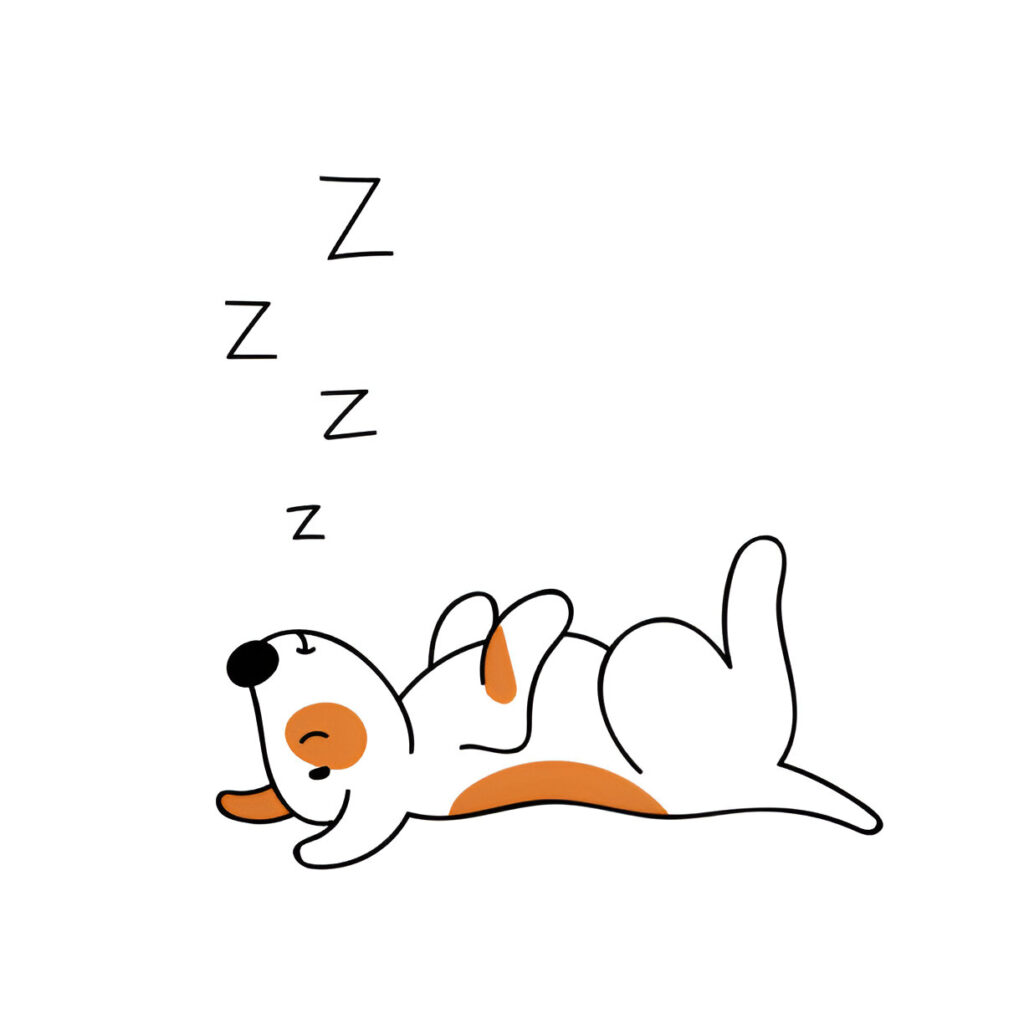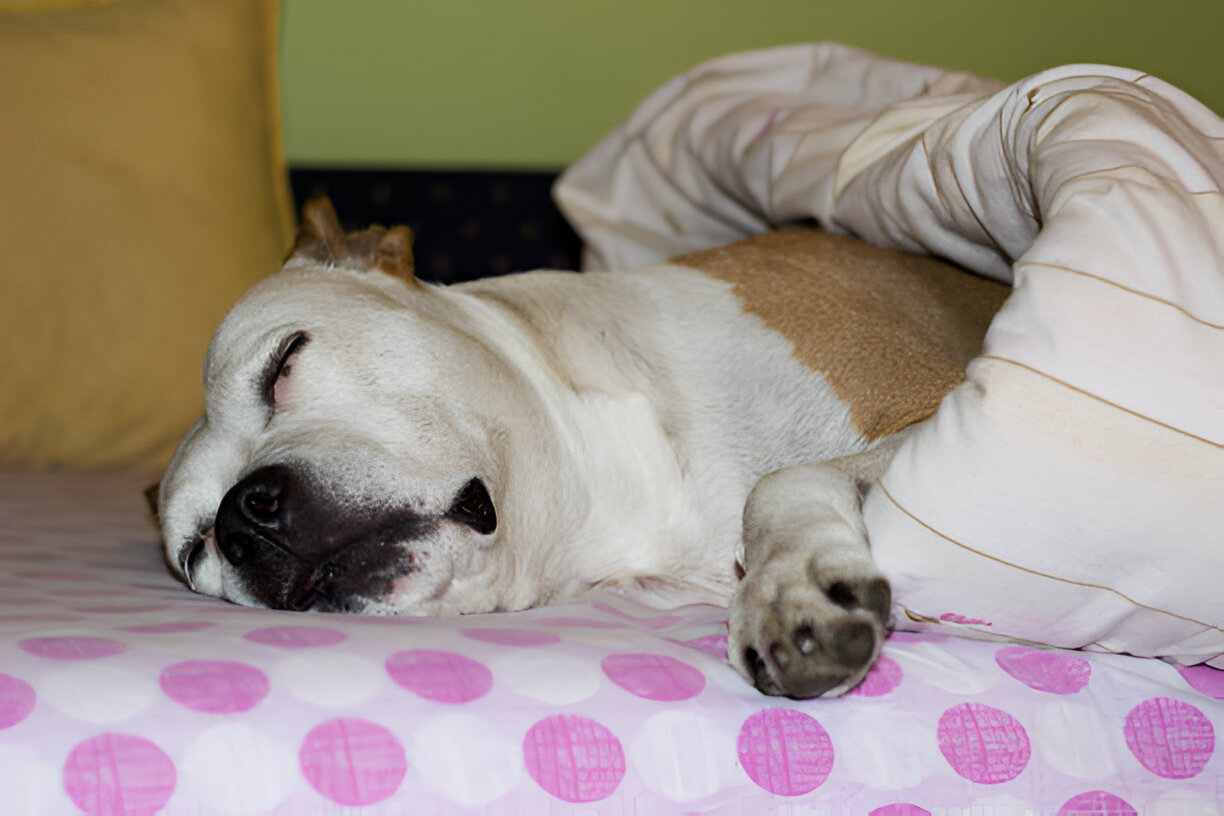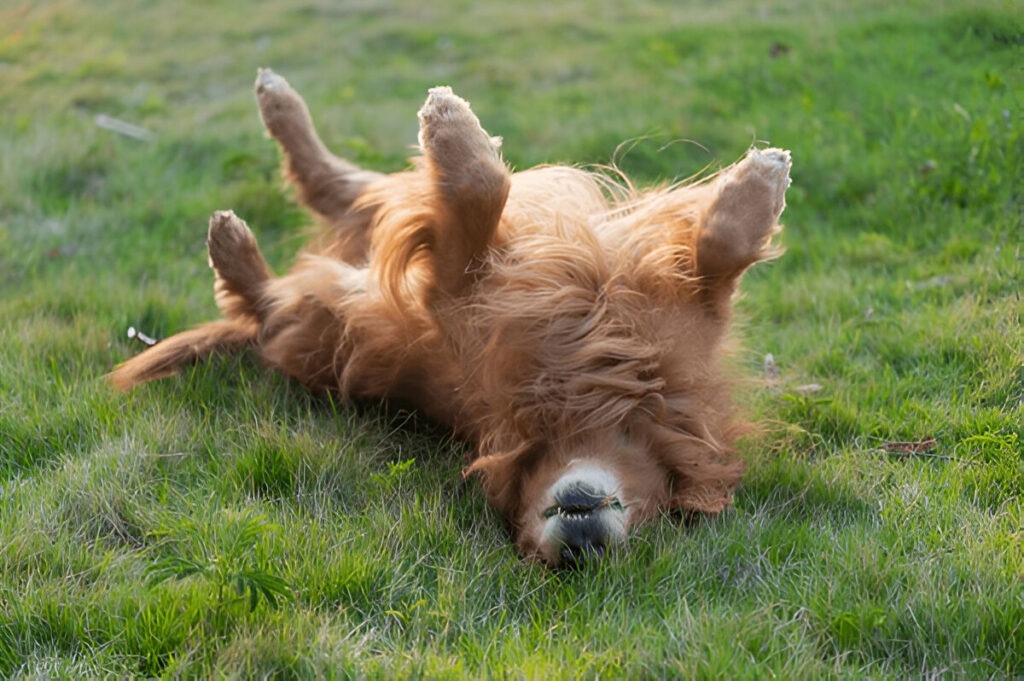Why Does My Dog Snore?
If you’ve ever been woken up in the middle of the night by the sound of your dog snoring, you might have wondered why it happens. Just like humans, dogs snore for a number of different reasons. While some snoring is completely normal, excessive or sudden snoring could indicate an underlying issue. Here’s everything you need to know about why your dog snores and what you can do about it.
Common Causes of Dog Snoring

1. Anatomy and Breed
Their anatomical composition predisposes them to snoring. Brachycephalic breeds, such as the Bulldog, Pug, and Shih Tzu, become most affected since the small size of the noses, combined with their extended soft palates, acts to partially block the airways and may, therefore, result in snoring. Even the non-brachycephalic breeds will snore if other conditions, such as nasal congestion or structural abnormality, serve to partially block their airways.
2. Sleeping Position
The sleep pattern of the dog may also cause snoring. For instance, a dog sleeping on its back may have a partially obstructed airway because of its tongue, causing it to snore. This type of snoring is harmless and tends to resolve when the dog changes positions during sleep.
3. Allergies
Dogs, like humans, can experience allergies triggered by substances such as pollen, dust, mold, or specific foods. These allergies can cause nasal congestion, swelling, or inflammation of the airways, making it more difficult for your dog to breathe quietly. Managing your dog’s exposure to allergens and seeking veterinary advice can help alleviate this issue.
4. Obesity
Excess body weight can cause fatty deposits to build up around a dog’s throat, narrowing his airway, which can, in turn, cause him to snore. Though overweight dogs are more prone to this problem, many cases of snoring can be greatly reduced, if not completely eliminated, by simply keeping your dog at a healthy weight through diet and exercise.
5. Nasal or Respiratory Issues
Temporary conditions usually include a cold, a sinus infection, or nasal polyps in which air has to navigate past the blockages, causing loud snoring noises. If your dog has other symptoms like nasal discharge, sneezing, coughing, or problems breathing, consult your veterinarian for proper identification and treatment.
6. Secondhand Smoke or Environmental Irritants
Cigarette smoke, strong cleaning products, or air pollution could be environmental irritants that expose your dog to respiratory inflammation. Respiratory inflammation can easily cause snoring and other difficulties in breathing. Keeping your dog away from such environmental irritants helps your dog stay away from snoring and has good respiratory health.
7. Age
With age, the muscles and tissues of dogs relax, including those in the throat. This can result in snoring, which is usually just a normal part of the aging process. However, it is very important to monitor your senior dog for any other signs of discomfort or health issues to make sure they remain healthy.
8. Underlying Health Issues
Snoring can be a symptom of serious health problems, such as sleep apnea, tumors, or infections. If your dog snores along with other concerning symptoms, including lethargy, coughing, behavioral changes, or difficulty breathing, it is important to seek your veterinarian’s advice to rule out serious conditions and take further action.
How to Reduce or Prevent Dog Snoring

1. Change Their Sleeping Posture
Encourage your dog to sleep on their side rather than their back to prevent snoring due to an obstructed airway. Help them by using a dog bed designed to encourage a more comfortable, supportive sleeping posture. Orthopedic or bolster-style beds can help discourage back sleeping and provide a comfortable resting place.
2. Keep Them Lean
Excess weight can cause the formation of fat deposits around your dog’s throat that constrict this airway and contribute to snoring. Ensuring that your dog is well-conditioned with regular exercise and a balanced diet is essential. If your dog is obese, get your veterinarian to devise an individually suited weight loss plan involving portion control, nutrition, and an exercise routine suited to the age and breed of your dog.
3. Address Allergies
Allergies can lead to nasal congestion and inflammation that will make it difficult for your dog to breathe quietly. Begin by searching out and eliminating all possible allergens from your home, such as dust, pollen, mold, or food. Air purifiers and frequent washing of your dog’s bedding with hypoallergenic detergents may also decrease the amount of allergens. If symptoms of allergies are persistent, then consult your veterinarian for possible treatments, which can range from antihistamines and changes in diet to immunotherapy.
4. Avoid Environmental Irritants \
Smoking cigarette, strong cleaning agents, and artificial fragrances can irritate your dog’s respiratory system and thus cause snoring. Your house should always be smoke-free and use pet safe cleaning products. Spray and perfume should not be sprayed in front of your pet. This helps your dog breathe properly with fresh air and no chemicals.
5. Regular Veterinary Care
Routine veterinary visits are crucial for your dog’s health and may uncover underlying conditions that could be causing or exacerbating snoring. Be very aware of any sudden or extreme changes in your dog’s snoring pattern, as these could indicate health problems needing immediate attention. Your vet can perform detailed examinations, advise on diagnostic tests when necessary, and provide personalized solutions depending on your dog’s needs.
6. Surgery for Chronic Issues
Sometimes, structural airway issues require surgical intervention. This is very common in brachycephalic breeds of dogs characterized by pinched nostrils and elongated soft palates which interfere with breathing. Surgical procedures, including stenotic nares correction or removal of the soft palate, increase breathing and usually reduce snoring. If your dog has a chronic case of snoring, speak with your vet about surgical procedures that may fit him best.
When to See a Veterinarian

While snoring may be a normal occurrence for many dogs from time to time, it is pivotal to make a differentiation for when it may indicate an underlying problem. Here are instances where a trip to the vet is recommended:
- New or Increasing Snoring
Snoring could also be indicative of an emerging health problem in dogs-especially if they just started snoring recently or their snoring is suddenly getting much louder and/or more frequent. This can be due to several reasons: structural changes in the airway, allergic responses, or maybe increased weight.
- Signs of Distress
Snoring with any of the following symptoms could be indicative of something more serious: gasping for air, coughing, or unusual tiredness. Symptoms may indicate a respiratory problem such as obstruction, infection, or sleep apnea.
- Other Symptoms
Other signs of sickness include nasal discharge, sneezing, lessened appetite, lethargy, or behavioral problems with your snoring dog. Symptoms may be related to an infection, allergies, or an overall body condition in your pet that requires immediate veterinary attention.
- Breed Susceptible to Respiratory Problem
Other factors that may increase the risk include specific breeds, especially brachycephalic dogs, such as Bulldogs, Pugs, and Shih Tzus. Even mild snoring should be followed up on for these breeds, as they are at a higher complication risk.
- Persistent Snoring Despite Changes
If you’ve made adjustments to improve your dog’s sleeping environment such as reducing allergens, providing an orthopedic bed, or managing their weight—and the snoring persists, it’s time to seek professional advice.
Snoring can be cute or not bother anyone, but sometimes it can indicate discomfort or health issues. By closely watching your dog’s health and taking action where warranted, you are able to provide them with better health, better sleep, and an overall better quality of life. With proper care, your furry friend will breathe easier-and you can rest easy knowing they’re comfortable and healthy.

FAQ: Dog Snoring
1. Is it normal for dogs to snore?
Yes, occasional snoring is normal in many dogs and can be harmless. However, if the snoring is sudden, excessive, or accompanied by other symptoms, it may indicate an underlying issue.
2. Why do certain dog breeds snore more than others?
Brachycephalic breeds like Bulldogs, Pugs, and Shih Tzus are prone to snoring due to their unique anatomy. Their short noses and elongated soft palates can partially obstruct their airways, leading to snoring.
3. Can a dog’s sleeping position cause snoring?
Yes, a dog’s sleeping position can contribute to snoring. For example, dogs sleeping on their backs may experience temporary airway obstruction caused by their tongue. Changing positions often resolves this type of snoring.
4. Can allergies make my dog snore?
Yes, allergies to pollen, dust, mold, or certain foods can cause nasal congestion and airway inflammation, leading to snoring. Managing allergens and seeking veterinary advice can help alleviate this issue.
5. Does being overweight make a dog snore?
Yes, obesity can cause fat deposits around a dog’s throat, narrowing the airway and resulting in snoring. Maintaining a healthy weight through proper diet and exercise can significantly reduce or eliminate snoring in overweight dogs.
6. Are environmental factors like smoke or pollution related to snoring?
Yes, irritants such as cigarette smoke, strong cleaning products, and air pollution can cause respiratory inflammation, leading to snoring. Keeping your dog away from such irritants can help improve their breathing.
7. When should I be concerned about my dog’s snoring?
Consult your vet if:
- Snoring is new or has worsened.
- It’s accompanied by signs of distress like gasping, coughing, or fatigue.
- Other symptoms appear, such as nasal discharge, lethargy, or behavioral changes.
8. Can snoring indicate a serious health problem?
Yes, snoring can sometimes signal underlying health issues like sleep apnea, nasal polyps, tumors, or respiratory infections. Always consult a veterinarian if you suspect a health problem.
9. What can I do to reduce or prevent my dog’s snoring?
Here are some tips:
- Encourage your dog to sleep on their side.
- Maintain a healthy weight.
- Address allergies by minimizing exposure to triggers.
- Avoid exposing your dog to smoke or irritants.
- Schedule regular veterinary checkups to monitor their health.
10. Can surgery help with chronic snoring?
Yes, in some cases, surgical intervention may be necessary, especially for brachycephalic breeds with structural airway issues. Procedures like soft palate resection or correcting stenotic nares can improve breathing and reduce snoring.
11. Is snoring more common in older dogs?
Yes, as dogs age, their throat muscles and tissues can relax, leading to snoring. While this is often normal, it’s essential to monitor senior dogs for other signs of discomfort or health issues.
12. Should I worry if my dog snores but seems otherwise healthy?
If your dog appears healthy, eats well, and is active, occasional snoring may not be a cause for concern. However, always monitor their behavior and consult your vet if you notice any changes.





